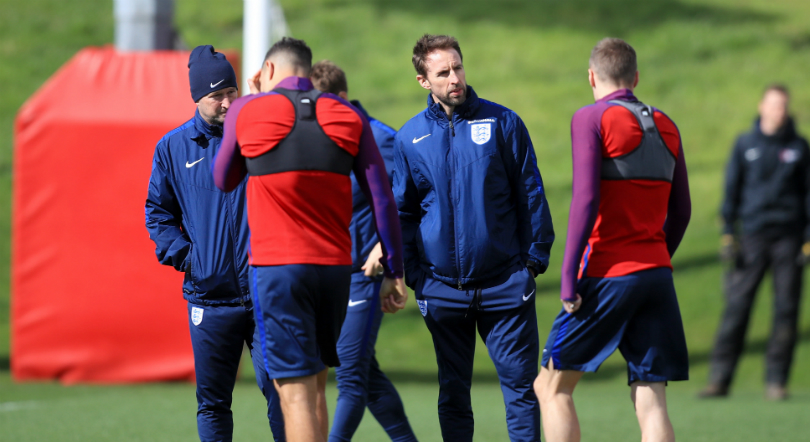Gareth Southgate: My guide to defending
England manager Gareth Southgate answers your defensive conundrums

As the big centre back in my team I’m expected to win every header, but I always get caught out by the opposition’s goal kicks. Do you have any tips for judging the flight of the ball?
Adekunle Kabir, via twitter
You have to quickly work out what sort of kick the keeper has got – i.e. what foot he is, where he normally kicks out and how far he can kick. It’s better to err on the side of caution to start with. Take up a starting position near the edge of the centre circle in your half – this will make it easier for you to back track or attack the ball depending on the length of the kick. Whatever you do, don’t drop too deep – this will leave too much space in midfield. If the ball drops short in midfield you can challenge for it. As the game goes on you can take a more advanced starting position.
You have also got to assess the striker you’re up against. Some forwards like to jump from a standing start, whereas others prefer to stand 10 yards to the side of you so they can get leverage on their jump. You’ve got to think about what your strengths are, but also the weaknesses of the forward you’re marking. I wasn’t particularly tall for a centre-half so if I was marking a Peter Crouch I probably wanted to be as close to him as I could. From there I could decide whether I was going to challenge for the ball or accept that I couldn’t win the ball and drop off. Our ego tells us we want to win every ball and dominate our opponent, but if they’re clearly better than you in the air then maybe it’s more sensible not to challenge them. If they take the ball down on their chest you can then deal with that.
My manager has switched me from centre midfield to centre back without really explaining what he wants from me. What are the main responsibilities of a central defender?
Matthew Bergin, via facebook
It sounds obvious, but most important thing to remember is what you’re defending – the goal. This will help you with positioning during the game. Look at where you are in relation to the goal and ask yourself, ‘Can I make it difficult for my opponent to score from this position?’ Then you’ve got to think about the qualities of the player you’re up against. At amateur level you’re never going to be 100 per cent of what you’re opponent is capable of – you may be marking a player you’ve never seen before – so give yourself a bit of space. He may be the quickest player you’ve ever seen so you’re going to have to give yourself a yard until you have assessed what his strengths are.
Get FourFourTwo Newsletter
The best features, fun and footballing quizzes, straight to your inbox every week.
It’s also important that you play to your strengths. For example, show the opponent on to your stronger side. Finally, always try to stay on your feet as long as you can. If you stay on your feet then the forward has always got to beat you. If you’re on your feet you’re still in the game and can recover to tackle if the forward does get pass you. As soon as you go to ground and don’t win the ball there’s a fair chance a foul will be given and you’re out of the game.
I always get really nervous playing at the back when we’re protecting a lead and I end up making a mistake. How do you handle this pressure?
Joe Nelson, via twitter
In this situation I used to think: “Great, we’re (the back four) involved, we’re the key to winning the game.” As a defender there aren’t many times where you get the opportunity to shine, so if there’s 10 minutes to play and loads of balls coming into your box then relish that challenge. It’s up to you to win the game and one of the few opportunities to get a lot of credit.
When it comes to the actual defending you have to stay calm and play the way have been throughout the match. Anticipate the inevitable late surges forward from the opposition so you don’t get caught cold. Keep their attacking players out of the box as much as possible and get your team-mates to put pressure on the initial ball in. You are one of the last lines of defence, but your full-backs must stop crosses coming into the box. Ultimately, you’ve got to defend as a team and it is your job to organize your teammates into an unbreakable defensive force.
My manager wants us to start playing out from the back – any tips for switching to this style of play?
Bo Cunningham, via facebook
You’ve got to keep practicing it in training and work on your first touch. If you can get the ball under control quickly then you’ll give yourself more time to pick the right pass. Try to play it forward, but that doesn’t mean a long pass. It might just be a 10 yard pass between two midfield players. The earlier you can play the ball forwards to one of your team-mates the better.
I’ve made a few costly errors at the back for my team and I’m finding it difficult to forget them – it’s affecting my form. How do you get over those mistakes?
Mick Jarvis, via facebook
The only way you improve is by making mistakes and learning from them – that’s the same in any business, not just in football. People who’ve never made a mistake either don’t exist or have never achieved anything. The way that you talk to yourself is important. You are going to make mistakes out on the field. If you go a goal down after five minutes, there is 85 minutes to put that right. You haven’t got to put it right within the first two minutes. You have to accept that some weeks you are going to be the guy that costs the team, but that is the beauty of football.
You’ve got a little voice inside your head that tends to focus on the negative. It’s vital that you control this voice and keep it positive. If made a couple of mistakes, I’d make sure my next action was nice and simple – I’d make a simple pass, for example, to get my confidence back. Ultimately, whatever has just happened, you’ve got to focus on the next challenge, the next pass, the next tackle. There’s nothing you can do about the past. It’s not easy to put that out of your mind on the field, but you have to find a way.
Striker's with good movement always drag me out wide and out of position. What should I do when they start to drift out to the channel?
Christian Millar, via twitter
Being dragged out wide isn’t a place that any centre half wants to be. The first thing for me about any kind of defending is delay. Delay the attacker and you can force them to make decisions. Forwards are very instinctive players and if you dive in you make the decision for them. If you are dragged out wide you need to give you team-mates time to fill in and occupy the space that you have left. Delay is the key to that. If you can force the forward to stay wide then that is better than allowing them to come inside and have a shot.
It’s always important to listen to your team-mates and as soon as it is possible for you to move back into the centre then go for it. In the modern game full-backs are often involved in attacking and that is always dangerous because the centre half might need to go and cover them. Because teams often play with one up front these days the spare centre half might often get dragged out by an attacking full-back so again it comes down to communication and making sure your team mates are aware of what is around them.
Gareth Southgate was speaking at the launch of the Carlsberg Pub Cup, a nationwide five aside competition for players of all standards. To register your pub visit www.carlsberg.co.uk/pubcup. Carlsberg is The Official Beer of The England Football Team and sponsor of UEFA EURO 2012.
For more football tips see:
Rio Ferdinand's Ultimate Defender
Sylvain Distin: Dominate your opponent
Franco Baresi: How to defend like a master
Chris Smalling: How to be the complete defender
Nemanja Vidic: Tackle any threat
Rio: The thinking man's guide to defending
Ashley Cole: How to handle every opponent
